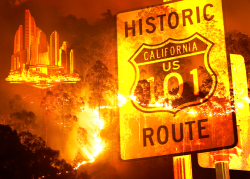Thirsty Southern California has a drop of good news.
The L.A.-based consortium and water wholesaler for public agencies that supply a population of about 20 million throughout the region has taken a step to advance a regional water-recycling plant that could eventually serve more than 500,000 homes.
The deal provides the Metropolitan Water District with a modest round of early funding for development of the $3.4 billion water recycling plant from public agencies in Arizona.
“This project could help the entire Southwest,” Adel Hagekhalil, Metropolitan Water District’s general manager, said in a release.
He framed the planned facility as part of the solution to replenishing the Colorado River, a primary water source for much of the western United States, with California, Arizona and Nevada all major users.
“That’s why our partners in the Lower Basin” — the parts of Arizona, Nevada and elsewhere that constitute the southern section of the vast Colorado River Basin — “are interested in helping us develop this project.”
The project holds the potential to eventually help relieve some strain on Southern California’s water supply, always a point of concern for residential and commercial developers as well as residents.
The agreement between the Metropolitan Water District and the Arizona agencies was announced last week. Under the agreement, the Central Arizona Project and the Arizona Department of Water Resources will contribute $5 million and $1 million, respectively, to the ongoing environmental planning work for the facility. That work, begun last year, is expected to take three years and cost $30 million.
The $6 million from the Arizona agencies is an initial investment, Hagekhalil said, and could lead to a longer-term deal where the agencies help fund the project in exchange for rights to some of California’s allotment of Colorado River water. The fully realized $3.4 billion facility would produce up to 150 million gallons per day and stand among the largest water recycling plants in the country.
The announcement follows a similar agreement Metropolitan Water District made last year with a southern Nevada agency that agreed to fund up to $6 million of the plant’s environmental work.
Around California, water access is expected to only become more urgent. The past 12 months were the driest the state has seen in a century, according to climatologists, with the next 12 months expected to be even worse.
The demand for recycled water — highly treated wastewater that in urban areas is most often used for non-potable purposes such as landscape irrigation and industrial cooling — has also been surging. Recycled water still represents a small fraction of overall water use, but as of 2019 its use had nearly tripled since the 1980s, according to the Public Policy Institute of California.
Read more


